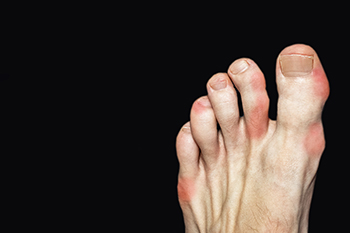
Wilmington (937) 382-2347
Fax
(513) 932-1606

Wilmington (937) 382-2347
Fax
(513) 932-1606
 Gout is a type of arthritis that causes sudden, severe attacks of pain, redness, and tenderness in joints, often affecting the feet. It occurs when urate crystals accumulate in the joints, causing inflammation and intense pain. These crystals form when there are high levels of uric acid in the blood. The body produces uric acid when it breaks down purines, substances found naturally in the body, and certain foods. Gout can affect anyone, but it is more common in men, postmenopausal women, and individuals with kidney disease or a family history of gout. In the feet, gout typically impacts the big toe, but it can also affect other parts like the ankles and heels. The pain can be excruciating, described as a burning or stabbing sensation, often waking individuals from sleep. Swelling, redness, and warmth in the affected area are common symptoms. To manage gout, lifestyle changes such as diet modification, weight loss, and avoiding alcohol are recommended. Medications to reduce uric acid levels and inflammation may also be prescribed. If you experience severe foot pain due to gout, it is suggested that you schedule an appointment with a podiatrist for targeted treatment and management strategies.
Gout is a type of arthritis that causes sudden, severe attacks of pain, redness, and tenderness in joints, often affecting the feet. It occurs when urate crystals accumulate in the joints, causing inflammation and intense pain. These crystals form when there are high levels of uric acid in the blood. The body produces uric acid when it breaks down purines, substances found naturally in the body, and certain foods. Gout can affect anyone, but it is more common in men, postmenopausal women, and individuals with kidney disease or a family history of gout. In the feet, gout typically impacts the big toe, but it can also affect other parts like the ankles and heels. The pain can be excruciating, described as a burning or stabbing sensation, often waking individuals from sleep. Swelling, redness, and warmth in the affected area are common symptoms. To manage gout, lifestyle changes such as diet modification, weight loss, and avoiding alcohol are recommended. Medications to reduce uric acid levels and inflammation may also be prescribed. If you experience severe foot pain due to gout, it is suggested that you schedule an appointment with a podiatrist for targeted treatment and management strategies.
Gout is a painful condition that can be treated. If you are seeking treatment, contact Dr. Gerald Perelman from Ohio. Our doctor will treat your foot and ankle needs.
What Is Gout?
Gout is a form of arthritis that is characterized by sudden, severe attacks of pain, redness, and tenderness in the joints. The condition usually affects the joint at the base of the big toe. A gout attack can occur at any random time, such as the middle of the night while you are asleep.
Symptoms
Risk Factors
Prior to visiting your podiatrist to receive treatment for gout, there are a few things you should do beforehand. If you have gout you should write down your symptoms--including when they started and how often you experience them, important medical information you may have, and any questions you may have. Writing down these three things will help your podiatrist in assessing your specific situation so that he or she may provide the best route of treatment for you.
If you have any questions, please feel free to contact our office located in Wilmington, OH . We offer the newest diagnostic and treatment technologies for all your foot care needs.